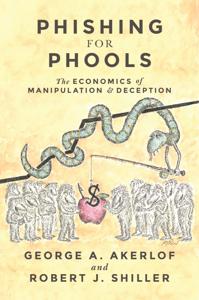
Want to learn the ideas in Phishing for Phools better than ever? Read the world’s #1 book summary of Phishing for Phools by George A. Akerlof, Robert J. Shiller here.
Read a brief 1-Page Summary or watch video summaries curated by our expert team. Note: this book guide is not affiliated with or endorsed by the publisher or author, and we always encourage you to purchase and read the full book.
1-Page Summary of Phishing for Phools
Overview
As part of your daily activities, you’ve probably gone to the grocery store, picked up some pills at the pharmacy or watched television.
Did you know that with every step or action, you were being manipulated?
In a free market system, everyone is susceptible to being phished. This happens when people try to convince you to take action that may be against your best interests. It’s used by advertisers and supermarket managers, even politicians. These key points show how phishermen spread temptation and deceptive information in order to make you a phool!
In this section, you will learn how phishing played a role in the 2008 financial crisis; why Sunkist oranges are manipulating your mind; and how companies hire scientists to boost their bottom line.
Big Idea #1: Far from being rational, free markets are full of irrational temptations for the “phool” consumer.
While we like to think of free-market economic systems as places where individuals make mutually beneficial trades based on rational decisions, the reality is much different.
In today’s economy, people are constantly being tricked into buying things they don’t need. The author defines this as phishing for phools.
Phishing is a process of getting someone to do something that helps you, but not necessarily them.
In a phishing scam, someone who falls for the scam is called a “phool”. A free-market economy with little to no government interference is perfect for such scams.
However, most economic textbooks will say that the majority of people make rational decisions when shopping for groceries. A typical example goes like this: you go to a supermarket and spend all your money on apples and oranges.
The number of apples and oranges you buy depends on the price of both fruits. It also depends on your personal preference for either apples or oranges.
Does this example reflect reality? Do we really make our buying decisions based on a rational assessment of a particular good’s price?
No, because the free market naturally creates opportunities to take advantage of consumer weaknesses.
If you think about it, the eggs and milk are probably located in the back of the store.
Milk, eggs, and other common grocery items are located in the back of stores because they’re expensive. However, that doesn’t stop us from buying them. We also buy things we don’t really need because we see them as a good value for our money. For example, cake mixes appeal to an individual’s desire to make something homemade even though it isn’t made from scratch with fresh ingredients like eggs.
In fact, many people will pay more for a product if they believe it is healthier or better quality than competitors.
“
Big Idea #2: Reputation mining, one way to phish for phools, played a central role in the 2008 financial crisis.
During the 2008 financial crisis, inflated housing prices in the United States finally popped. This caused a market crash that wreaked havoc in the US financial sector. The causes of this crisis have been extensively discussed by many people, but what has hardly been noted is how reputation mining contributed to it. Reputation mining refers to when people sell their good name for something less than its worth or value. In this case, if I am known as someone who sells beautiful and ripe avocados at a certain price, then I can now sell my customers mediocre avocados at that same price because they trust me as an avocado seller.
Like this summary? Want to learn more from books than ever? You'll love my product Shortform.
Shortform has the world’s best guides to 1000+ nonfiction books and articles. Even better, it helps you remember what you read, so you can make your life better. What's special about Shortform:
Sound like what you've been looking for? Sign up for a 5-day free trial here.
By using your reputation in a way that benefits you, but not the customer, you are manipulating them into doing something for your own benefit.







